When checking out the market for the best crossbow to fit your needs, the expanse of options is overwhelming. The following guide contains information about how to choose the best crossbow for every situation. You will also find a concise breakdown of crossbows to fit all budgets. This guide will provide a clear understanding of a crossbow’s capabilities, the features that are most coveted, and familiarize you with some of the best brands of crossbows on the
The #1 Crossbow We Recommend
It is nearly impossible to pick a single crossbow to recommend, especially considering the wide range of options. But, if we had to do it, our #1 pick would be the Barnett Whitetail Pro STR Crossbow. While it is moderately priced, it is also an extremely high-quality weapon that fulfills most shooter’s needs. The Barnett Whitetail Pro is one of the top sellers on the market and has excellent reviews from both customers and professionals.
Best Crossbow for Hunting
The top pick overall is also your best bet for hunting — the Barnett Whitetail Pro (above). With its 165 lb draw weight and 400 fps shooting speed, it is more than capable of handling game animals. It also is reasonably priced.
Best Tactical Crossbow
The CenterPoint Sniper 370 is a wildly popular tactical crossbow with a 185 lb draw weight. The forearm and stock are fully adjustable for your convenience. To avoid scaring your game, the string has integrated noise dampeners to make the firing process less noisy and cumbersome. It doesn’t have the full silencing system that other CenterPoint products do the noise dampeners are better than nothing. The scope on the Sniper 370 is a 4x32mm that gives ample zoom and clarity in conjunction with the crossbow’s range.
Best Youth Crossbow
The Barnett Recruit Terrain is the perfect crossbow for a youth looking to upgrade from his or her beginner’s weapon. It features an impressive 140 lb draw weight and can fire bolts at up to 330 FPS (Feet Per Second). It has the same 4x32mm scope that comes on most higher end and advanced crossbows, so you won’t be missing out on the competition in terms of range. Regardless if you are right or left handed, the Recruit’s safety is double-sided for convenience for both types.
Most Powerful Crossbow
The Barnett Ghost 420 Revenant CRT is one of the most powerful crossbows you can buy, and the price is exceptional for a bow of this quality. The speed of the bow conquers 420 feet per second, sending a bolt screaming toward its target. The draw weight on the bow is 185 pounds. The bow has a mid to upper-level price between $875.00 and $1,200.00 for the unit. The Barnett Ghost 420 comes complete with a premium variable scope, talon sling, three bolts, a quiver, and a rope-cocking device. The bow features a riser made of Carbonlite® materials, thereby offering a five to one safety factor and the ideal balance between speed and weight.
Best Crossbow Under $600
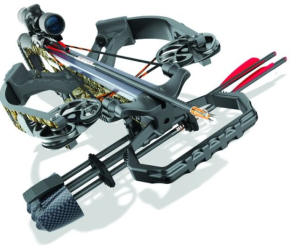 Priced around $580.00, the Barnett BC (Buck Commander) Raptor Reverse Draw Crossbow has a form specific geometric design for ease of hand placement repetition. The design of the crossbow allows for elevation of your index finger for the perfect placement, and the perfected design allows for ease of target acquisition. The limb pockets are positioned closer to the bow’s trigger assembly so the bow’s center of gravity shifts nearer to your body and lends to a balanced bolt shot each time. The Barnett BC Raptor Reverse Draw Crossbow shoots a bolt at a speed of 330 feet per second and the bolt is backed by 97-foot pounds of kinetic energy. The butt pad is adjustable and the unit comes with an anti-dry-firing trigger.
Priced around $580.00, the Barnett BC (Buck Commander) Raptor Reverse Draw Crossbow has a form specific geometric design for ease of hand placement repetition. The design of the crossbow allows for elevation of your index finger for the perfect placement, and the perfected design allows for ease of target acquisition. The limb pockets are positioned closer to the bow’s trigger assembly so the bow’s center of gravity shifts nearer to your body and lends to a balanced bolt shot each time. The Barnett BC Raptor Reverse Draw Crossbow shoots a bolt at a speed of 330 feet per second and the bolt is backed by 97-foot pounds of kinetic energy. The butt pad is adjustable and the unit comes with an anti-dry-firing trigger.
Best Crossbows Under $400
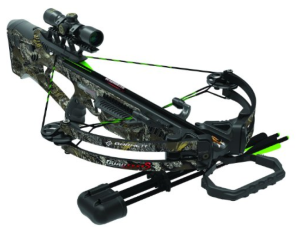 The Barnett Quad Edge Crossbow shoots bolts at a speed of 350 feet per second. The model bears a price tag under $400 currently. The Barnett Quad Edge is crafted with a riser made of magnesium, finger reminders, a foregrip with pass-through features, and comes sold with three bolts, a quiver, and an anti-vibration foot stirrup. The unit has a CNC machined 7/8 Inch Picatinny rail. This bow will also appeal to the consumer who appreciates buying products Made in the USA.
The Barnett Quad Edge Crossbow shoots bolts at a speed of 350 feet per second. The model bears a price tag under $400 currently. The Barnett Quad Edge is crafted with a riser made of magnesium, finger reminders, a foregrip with pass-through features, and comes sold with three bolts, a quiver, and an anti-vibration foot stirrup. The unit has a CNC machined 7/8 Inch Picatinny rail. This bow will also appeal to the consumer who appreciates buying products Made in the USA.
 Priced as an entry-level crossbow beginning around $389.00, the SA Sports Crusader Crossbow is a promising piece of equipment for the avid archer. The limbs are crafted out of compression fiberglass and camo colored. The manufacturer constructs the bow out of durable machined aluminum. The unit comes with the quick detach quiver, anti-dry fire features, and a 4X32 Multi Reticle Scope. Fitted with a 225-pound draw weight, the Crusader features a 13.5-inch power stroke, a precision trigger assembly, ambidextrous auto safety functions, and a rear stock that is lightweight and cleanly designed. This camo-dipped crossbow comes with the assembly hex keys and four 20-inch carbon bolts for firing. Also called the Crusader 330 FPS, the overall weight of the bow is 6.5 pounds.
Priced as an entry-level crossbow beginning around $389.00, the SA Sports Crusader Crossbow is a promising piece of equipment for the avid archer. The limbs are crafted out of compression fiberglass and camo colored. The manufacturer constructs the bow out of durable machined aluminum. The unit comes with the quick detach quiver, anti-dry fire features, and a 4X32 Multi Reticle Scope. Fitted with a 225-pound draw weight, the Crusader features a 13.5-inch power stroke, a precision trigger assembly, ambidextrous auto safety functions, and a rear stock that is lightweight and cleanly designed. This camo-dipped crossbow comes with the assembly hex keys and four 20-inch carbon bolts for firing. Also called the Crusader 330 FPS, the overall weight of the bow is 6.5 pounds.
Best Crossbow Under $300
 The SA Sports Ambush Crossbow has a listed price between $235.00 and $299.00. The bow is light, weighing in at only 6.5 pounds. The limbs are created out of compression fiberglass and the unit comes complete with four bolts, a quiver, and a 4X32 Multi-Reticle Scope as well as a Rope Cocking Device. The model features a 150-pound draw, a large stirrup, and can shoot a bolt at a speed of 285 feet per second. The SA Sports Ambush Crossbow is an ambidextrous option and requires 16-inch 2219 Aluminum arrows or 20 in carbon bolts.
The SA Sports Ambush Crossbow has a listed price between $235.00 and $299.00. The bow is light, weighing in at only 6.5 pounds. The limbs are created out of compression fiberglass and the unit comes complete with four bolts, a quiver, and a 4X32 Multi-Reticle Scope as well as a Rope Cocking Device. The model features a 150-pound draw, a large stirrup, and can shoot a bolt at a speed of 285 feet per second. The SA Sports Ambush Crossbow is an ambidextrous option and requires 16-inch 2219 Aluminum arrows or 20 in carbon bolts.
Best Crossbow Under $200
 With a starting price of $179.00, the SA Sports Empire Terminator is an exceptional entry-level bow. This model is available in a camo or black exterior, has a 175-pound draw, and has a speed of 260 feet per second. The Empire Terminator is lightweight (only 4.5 pounds) making it easy to tote around. Some call the Empire Terminator one of the best values in the industry. The Empire Terminator Crossbow has a quick detach quiver, ambidextrous auto safety, a Precision trigger assembly, scope mount, and the manufacturer’s trademark Gull Wing™ design.
With a starting price of $179.00, the SA Sports Empire Terminator is an exceptional entry-level bow. This model is available in a camo or black exterior, has a 175-pound draw, and has a speed of 260 feet per second. The Empire Terminator is lightweight (only 4.5 pounds) making it easy to tote around. Some call the Empire Terminator one of the best values in the industry. The Empire Terminator Crossbow has a quick detach quiver, ambidextrous auto safety, a Precision trigger assembly, scope mount, and the manufacturer’s trademark Gull Wing™ design.
Best Crossbow Brands
Barnett
Barnett has proven a tremendously successful name in the arena of archery equipment sales. The company has sold as many as a million crossbows to date. Barnett was launched over fifty years ago, and with each passing year works to make improvements on its existing line with groundbreaking patents. Barnett ranks number one in terms of crossbow manufacturers and the company creates bows built for hunting as well as bows known for their efficiency, accuracy, and speed. Barnett is known as the creator of the first compound crossbow, called the Demon, and the Commando Self-Cocking Crossbow.
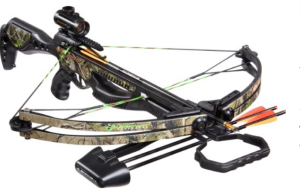 TheBarnett Whitetail Pro is a spectacular specimen in terms of what this company has to offer. The mid-range price makes the bow affordable, with an upper price of about $400.00, and the unit comes complete with a premium red dot sight, bolts, a quiver, a cable system, synthetic string, high-energy wheels, and a military style bow stock. This bow is capable of shooting an arrow at a speed of 315 feet per second and has a draw weight of 150 pounds.
TheBarnett Whitetail Pro is a spectacular specimen in terms of what this company has to offer. The mid-range price makes the bow affordable, with an upper price of about $400.00, and the unit comes complete with a premium red dot sight, bolts, a quiver, a cable system, synthetic string, high-energy wheels, and a military style bow stock. This bow is capable of shooting an arrow at a speed of 315 feet per second and has a draw weight of 150 pounds.
Excalibur
Excalibur is a refreshing player among archery competitors. Rather than focusing on major profits from the archery industry, the company was established by hunters who exude a passion for hunting and enjoy building high-quality crossbows. The brand Excalibur is in no way cheap as the manufacturer places value on quality over affordability. The goal of the manufacturer is to make bows that are accurate, reliable, and efficient. No engineers work for Excalibur, rather the ideas come from those who are familiar first-hand with hunting. The company has been in business since 1983.
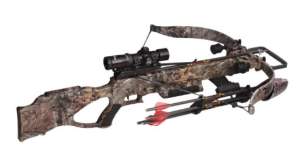 The Excalibur Matrix Crossbow features a 260-pound draw and delivers a speed of 380 feet per second. Excalibur crossbows are the upper-level bows on the market, with a listing price between $1029.99 and $1,099.99. The bow is equipped with an ergo-grip stock meaning it is ergonomically designed to ensure a proper grip for maximum comfort and minimal risk of injury. This recurve bow promises functionality, reliability, blazing bolt speeds, and a quiet shot. The bow comes with a Tact-Zone compact crossbow scope.
The Excalibur Matrix Crossbow features a 260-pound draw and delivers a speed of 380 feet per second. Excalibur crossbows are the upper-level bows on the market, with a listing price between $1029.99 and $1,099.99. The bow is equipped with an ergo-grip stock meaning it is ergonomically designed to ensure a proper grip for maximum comfort and minimal risk of injury. This recurve bow promises functionality, reliability, blazing bolt speeds, and a quiet shot. The bow comes with a Tact-Zone compact crossbow scope.
TenPoint
In 2012, TenPoint saw its 20th year in the business of selling archery equipment. The company is headed up by Richard L Bednar, who serves as the CEO, Chairman, and President. Rick’s father is Bill Bednar: The Archery Hall of Famer, and his mother, Edith, is the Ohio-based Portage Archery Center’s founder. Rick and his sisters Joanna and Cindy operate TenPoint as a family business. TenPoint has a number of innovations under its belt, including the 1995 patented VibraCush®: a bow to barrel sound dampener. The company also created the Dry Fire Inhibitor, a mechanism made specifically for the prevention of accidental firing. Since 1995, TenPoint has gotten 29 US patents, two Canadian patents, and now has at least 19 more in pending status. TenPoint also acquired Horton Archery and the Wicked Ridge line in the acquisition.
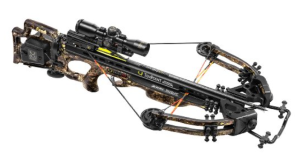 The TenPoint Stealth FX Crossbow has a starting price of around $1,270.00 and an uppermost price of about $1,300.00. The bow can shoot speeds up to 370 feet per second. The archer gets an impressive and unparalleled level of maneuverability with the TenPoint Stealth FX Crossbow because of the bow’s lightweight construction. This crossbow weighs 6.8 pounds in total. The Stealth FX is one of the sleekest, most compact, and shortest crossbows TenPoint designs.
The TenPoint Stealth FX Crossbow has a starting price of around $1,270.00 and an uppermost price of about $1,300.00. The bow can shoot speeds up to 370 feet per second. The archer gets an impressive and unparalleled level of maneuverability with the TenPoint Stealth FX Crossbow because of the bow’s lightweight construction. This crossbow weighs 6.8 pounds in total. The Stealth FX is one of the sleekest, most compact, and shortest crossbows TenPoint designs.
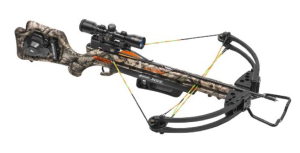 Also, Tenpoint now sells Wicked Ridge models with ACU-52 features. The Wicked Ridge Invader G3 has a listing price that is between $500.00 and $550.00. The Wicked Ridge can shoot bolts at a speed of 330 feet per second. The bow only weighs 6.6 pounds and has a 3.5-pound trigger, a quiet shot, and a 165-pound draw. The body of the bow features the Mossy Oak® Treestand® camouflage pattern, thereby making it a perfect choice for hunting. The bow’s riser is made of aluminum materials and features cutouts that minimize the weight of the bow while simultaneously increasing the crossbow’s strength. The dry fire inhibitor feature is also included with the addition of Tenpoint’s DFI.
Also, Tenpoint now sells Wicked Ridge models with ACU-52 features. The Wicked Ridge Invader G3 has a listing price that is between $500.00 and $550.00. The Wicked Ridge can shoot bolts at a speed of 330 feet per second. The bow only weighs 6.6 pounds and has a 3.5-pound trigger, a quiet shot, and a 165-pound draw. The body of the bow features the Mossy Oak® Treestand® camouflage pattern, thereby making it a perfect choice for hunting. The bow’s riser is made of aluminum materials and features cutouts that minimize the weight of the bow while simultaneously increasing the crossbow’s strength. The dry fire inhibitor feature is also included with the addition of Tenpoint’s DFI.
SA Sports
Mark N. Ambrose is the founder of SA Sports, LLC. Ambrose has at least two decades of industry-related experience, particularly with the crossbow, and remains an avid outdoors enthusiast. SA Sports makes premier outdoor gear and crossbows. The company keeps innovation and customer value at the heart of every product it creates. The current line of archery equipment includes the Ripper, Vendetta, Fever, Crusader, Ambush, and the Empire Recon, Terminator, Dragon, Beowulf, and Aggressor. SA Sports offers a one-year warranty with all of its equipment.
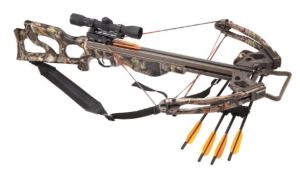 Priced between $600.00 and $650.00, the SA Sports Vendetta Crossbow is an affordable mid-level bow with a superior design. The Vendetta has a draw weight equal to 200 pounds and weighs 8.5 pounds in total. Each shot from the SA Sports Vendetta moves at 375 feet per second. You can expect top-notch performance from the SA Sports Vendetta and get a series of features that make the crossbow a worthy investment, some of which are associated with the far pricier models on today’s market. The SA Sports Vendetta comes with an ambidextrous auto safety feature, a 4×32 illuminated and multi-range crossbow scope, a 3.5-pound Precision Ultra Refined crossbow trigger pull, and anti-dry fire protection. The unit is sold with four-carbon bolt, a quick-detach quiver, hex keys for assembly, a padded shoulder sling, and a rope-cocking device along with the included scope.
Priced between $600.00 and $650.00, the SA Sports Vendetta Crossbow is an affordable mid-level bow with a superior design. The Vendetta has a draw weight equal to 200 pounds and weighs 8.5 pounds in total. Each shot from the SA Sports Vendetta moves at 375 feet per second. You can expect top-notch performance from the SA Sports Vendetta and get a series of features that make the crossbow a worthy investment, some of which are associated with the far pricier models on today’s market. The SA Sports Vendetta comes with an ambidextrous auto safety feature, a 4×32 illuminated and multi-range crossbow scope, a 3.5-pound Precision Ultra Refined crossbow trigger pull, and anti-dry fire protection. The unit is sold with four-carbon bolt, a quick-detach quiver, hex keys for assembly, a padded shoulder sling, and a rope-cocking device along with the included scope.
How to Choose the Best Crossbow for your Needs
In this section, we will cover the factors that should be taken into consideration when buying a crossbow, as well as provide a general overview of crossbow features and use.
History and More
Crossbows are an innovation first occurring in the 4th-century B.C.E. Their ease of use and accuracy of striking a target led to the adoption of the weapon for use in battle. Circa 209 B.C.E., China had an army in which every soldier was armed with a crossbow, all 50,000 of them. If you want to read more about the history of crossbows, check out the Wikipedia entry on the weapon.
 The crossbow’s greatest asset is the simplicity of its use. The user can aim the bow and fire, just like using a gun, and the learning curve for using crossbows is fairly mild. The same was not the case with the Welsh longbow, however, as the bow was more difficult to draw back and to control the direction of the arrow.
The crossbow’s greatest asset is the simplicity of its use. The user can aim the bow and fire, just like using a gun, and the learning curve for using crossbows is fairly mild. The same was not the case with the Welsh longbow, however, as the bow was more difficult to draw back and to control the direction of the arrow.
So many crossbow options are available, it is not uncommon for the neophyte archer, or even the individual experienced in archery, to be confused about where to begin in the shopping process. In fact, in the past two decades alone, the equipment available for archery, whether for competitive or hunting purposes, has changed dramatically. Brand new bow designs, arrows, strings, sights, and materials are making archery equipment more durable and diverse than ever before.
Crossbow Types
Two chief forms of this innovative weapon are in use today: the compound and the recurve crossbow. Each bow type has pros and cons, and understanding these will affect the choice you make when looking for the best crossbow for your individualized needs.
Design
Recurve crossbows were in use before compound crossbows. In terms of bow design, it becomes easy to identify the recurve configuration of a bow: the limbs of the bow will form an inverted letter “U” and the end of each limb will curve out and a bit backward. On a compound crossbow, however, the limbs do not curve at the ends. The recurve crossbow is equipped with few breakable components. The recurve does not have the asymmetrical wheel or round wheel components found on a compound model. The bow is simple to maintain and if the string becomes damaged or breaks, it can be easily replaced. Recurve bows don’t have a cocking mechanism, which makes cocking the bow a bit more difficult. The absence of the cocking mechanism makes the recurve model slightly less accurate than the compound crossbow. Between the recurve and compound crossbow, the recurve is the unit with the quieter shot. Beginners looking for a suitable bow will do well by the recurve crossbow, it is less expensive and generally easier to use.
Strength
If having a strong bow is of great importance, the compound crossbow is the better option. Recurve crossbows end up being weaker because they have greater width than the compound bow. The wider bow makes recurve bows more difficult to handle. The compound version of the crossbow is fitted with pulleys that attach to the limbs. The bowstring is shorter and drawing the bow is easy due to the inclusion of a cam system. The cam system makes for easy drawing of the bow. The system permits the storage of energy, and it helps to make the compound crossbow more powerful. Bolts released from a compound bow fly faster and a cocking mechanism makes for easy bow drawing. With shorter limbs, the compound crossbow is ideal for the archer who covets a bow that is easy to manage, especially in tight areas.
Bear in mind that the extra components on the bow, like the pulley system and camshaft, add to the weight of the bow. In addition, more components means more parts that potentially need replacing in the future. In terms of price, an archer can expect to pay more for the compound model.
Modern Innovations
Modern design has resulted in a change of material used for crafting the crossbow. Just a few decades ago, every crossbow was fit with limbs made of durable steel. Current models are made of composite materials or fiberglass. Split-limb composite builds lend to the equalization of stress and a reduction in the bow’s weight.
Modern bow stocks are laminated wood and plastic with reinforcing metal components. Molded stocks allow for greater variation of design and style. If looking for a bow with a lighter weight, the archer can choose one with a skeletal stock to contribute to the weight reduction. Bear in mind, however, that heavier crossbows have greater firing accuracy; heavyweight contributes to bow stability.
Power
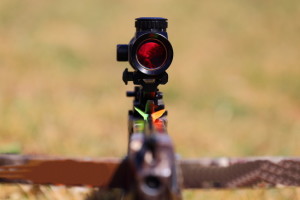 Crossbows are ranked according to pull weights ranging from 80 to 200 pounds. The string is stressed and in turn propels a bolt at a speed up to 340 feet per second. For hunting deer, a 150-pound draw weight is sufficient and should be The latter easy enough to accomplish when making use of the foot stirrup. Using a rope cocking aid lends to greater accuracy and an evenness of the string drawback. Plus, it lessens the weight of the pull by as much as half. If you opt for a crank cocking aid, it takes between 10 to 15 pounds of pressure to cock the bow. The crank aid is cumbersome and slow.
Crossbows are ranked according to pull weights ranging from 80 to 200 pounds. The string is stressed and in turn propels a bolt at a speed up to 340 feet per second. For hunting deer, a 150-pound draw weight is sufficient and should be The latter easy enough to accomplish when making use of the foot stirrup. Using a rope cocking aid lends to greater accuracy and an evenness of the string drawback. Plus, it lessens the weight of the pull by as much as half. If you opt for a crank cocking aid, it takes between 10 to 15 pounds of pressure to cock the bow. The crank aid is cumbersome and slow.
Crossbow Uses
It is good to consider why and how you will be using the crossbow. Do you plan to use it for hunting game, target practice, or competitions? There are different bows better suited for different uses. If you plan to use the equipment for target practice with field points or arrowheads, the size of the crossbow and the weight of the unit do not play a serious role, since you can fire the arrows while remaining stationary. In this scenario, it will also be easier to avoid the tight spaces where you might have trouble maneuvering a crossbow. Alternatively, if you plan on hunting prey, it becomes necessary to buy a durable crossbow, preferably one with a scope for ease of spotting prey during the hunt.
Draw Weight
Before buying a crossbow, know how you plan to use it. The draw weight for a crossbow appropriate for hunting will differ from the draw weight one needs for target shooting. To that end, some states have issued laws regulating the minimum draw weight a crossbow can have as well as the weight of the bolts it uses. You will need to look into the acceptable draw weight for hunters/archers in your residing state. The average range of draw weight noted in varying state regulations falls between 75 and 125 pounds. This amount is sufficient to kill a whitetail deer when within a moderate range of the animal. The crossbows crafted by leading manufacturers in the industry feature draw weights between 150 and 175 pounds on average, with some bows having a bit less in terms of weight or climbing as high as 200 pounds for a draw weight. The higher the poundage, the faster the shot a crossbow delivers.
Manufacturer
It’s not a bad idea to find out a bit about the crossbow manufacturer. The more you know about the company who creates the bow, the more you know about determining bow quality. Check out the official websites of crossbow manufacturers who make the bows you are considering for purchase. Additionally, look into the company’s reputation, the year of launch, and make sure you use some research tools to see what other archers are saying about the various crossbow brands.
Noise
The amount of noise a crossbow produces is of particular importance when planning to hunt live game. Keep in mind that you cannot escape making some kind of noise with a crossbow, but there are some models that prove quieter than others. For instance, that bow features cam mechanisms will be noisier than a bow that does not. A compound bow is often noisier than a recurve crossbow. If the crossbow features parallel limbs, it will likely have a quieter shot.
In the event you are dissatisfied with the noise level of the crossbow you buy, there are accessories to muffle the noise. These accessories are made for the purposes of diminishing the amount of vibration generated by the crossbow’s limbs once a shot is fired. The archer must attach noise-dampening accessories directly to the limbs to quiet down the movement.
Velocity
If you are concerned about the amount of speed your bow will deliver, you should opt for a compound crossbow rather thane recurve models. The compound crossbow is capable of storing a greater amount of energy. Using the correct bolts with your bow will also influence the speed of each shot. When buying a new bow, the bow’s manufacturer provides you with information on bolt size. If bolts are not the correct size, your bolt firing will end with erratic results. Even worse, if you use an excessively light bolt with a powerful crossbow, it can end up breaking the bolt or causing potential damage to your equipment.
When it comes to the velocity of the crossbow, references of speed will appear as feet per second or FPS in a crossbow’s description. This figure explains the amount of force behind each arrow. Speeds over 200 feet per second are ideal for hunting small game, even though you can also use such crossbows for target practice. If you want to hunt big game, you will need a crossbow that has a velocity ranging from 201 to 410 feet per second. The latter velocity range is commonly found in upper level crossbows.
If you choose a crossbow that delivers considerable speed it will likely be noisier than a crossbow with a lower velocity. In addition, the higher speed crossbows will most certainly deliver a harsher recoil when you fire a shot. The main difference between a crossbow that shoots 200 fps and a crossbow that shoots 350 fps is that the latter will deliver a trajectory that is flatter once you fire the weapon. The flat trajectory lends to the ease of making distance judgments. Many manufacturers increase the speed a crossbow can deliver by increasing the bow’s weight, power stroke, and by adding cams. The tradeoff for additional speed includes increased recoil intensity, and a louder shot.
Weight
Weight is an important factor to consider. Firstly, if you plan to use the bow for hunting, it’s important to consider the portability of the unit. That said, you will find heavier crossbows lend to greater shot accuracy. This is because the weight of the bow stills the bow and causes less vibration that lighter options. Hefty crossbows are recommended for the novice seeking to get an accurate shot. As an archer, you need to consider your physical limitations as well, and what bow weight you can handle with the most ease. Bear in mind that if a crossbow is excessively light, it can cause the bow to have a harsher recoil when fired, and in fact, can be more difficult to control. In contrast, a crossbow that is too heavy can be tiresome and difficult to control.
Accessories
 While shopping around for a crossbow, some will be sold with a kit containing everything for immediate use. Others may require specific accessories such as rope-cocking devices or a scope. Take the time to price and compare accessories so you can create the ultimate crossbow setup.
While shopping around for a crossbow, some will be sold with a kit containing everything for immediate use. Others may require specific accessories such as rope-cocking devices or a scope. Take the time to price and compare accessories so you can create the ultimate crossbow setup.
Triggers
The trigger of your bow should be of good quality. The creep affect and trigger poundage play a role in how accurately the crossbow shoots. A trigger without any creep is one that essentially releases a bolt with no warning or travel before release. The latter type of trigger and creep combination can prove dangerous. In contrast, a trigger with excessive creep can become difficult to squeeze or set off with any level of consistency. The premium triggers on the market lend to the accuracy of your shot because they have optimal poundage and travel.
Crossbow Buying Tips
Tip #1: Check out more than one crossbow option before you buy. Make sure you take the time to examine several different brands before you make your final purchase. Before ordering a bow online, you might want to visit a local dealer so you can compare prices, try holding the different crossbows to see how they feel, and talk to the dealer to get some advice about a crossbow investment. Whether you buy from a shop online or in-store, it is your job to do all the comparative research in terms of features and price. It is better to take your time to discover all the options available than to act on the first good deal you find. There may be an even better deal waiting for you in a continued search.
Tip #2: Make sure you know the laws regulating archery. It is important to reflect on the kind of bow you desire, the type of archery you will perform, and what you are willing to spend on your bow investment. As a future archer, you must find out about state and local laws pertaining to bow use and adhere to all state and federal hunting regulations. Each state has varying laws regarding crossbow use.
Tip #3: When shopping for a crossbow, do not forego quality for a lower price tag. There are crossbows for sale that can meet any kind of budget imaginable. It is of incredible importance that you take the time to assess a crossbow’s features, what others have to say about a crossbow, and the reputation of the bow’s manufacturer before you buy. Do not let a low price rush you into buying before fully considering the investment. Durability and longevity are key considerations to get the most for your money.
Tip #4: Consider purchasing a complete package instead of an individual crossbow. In addition to the bow itself there are packages containing everything you need to get started with archery. Packages often contain the crossbow, quivers, bolts, and scopes. Of course, the initial pricing for a package will be higher than the price for a bow alone, but packages can save you a considerable amount of shopping time. Additionally, packages are pre-packed by the manufacturer which ensures that all the bolts are the correct size and weight.
Tip #5: Review the crossbow’s warranty, if applicable. Check to see if a warranty comes with your purchase, and if so, how long it lasts and what it covers. Knowing what a warranty covers is crucial since some warrantees have clauses that include an explanation of actions that are not allowed in terms of the care/repair of the crossbow. If you violate the terms of the warranty, you will likely lose the coverage entirely.
Conclusion
Due to the precision a crossbow can provide, crossbow equipment is in high demand. To address this high demand, manufacturers create a variety of unique crossbow models which thereby increases the number of options a consumer has to consider. When shopping for a crossbow, the sheer number of options can be overwhelming. The key to finding the best crossbow for your needs is in understanding different bow styles and what they as well as how certain accessories work with a particular bow. In depth research of bows and accessories (in terms of both cost and features) is imperative to find a crossbow that will serve your needs for many years to come.

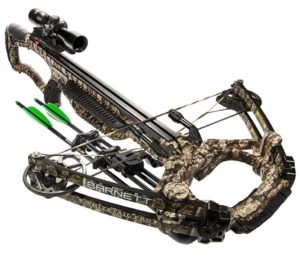


Why didn’t you include any of the Stryker crossbows?
why did’nt include the Scorpyd crossbows
a friend in N.C. has a sports shop and he told me that probably 70% of the crossbows he has in for repair are Barnetts. maybe because they sell so many but thats a big percentage. PSE makes great crossbows and they hardly ever get a mention on any site. id put my PSE Toxic up against any of these and put most of em to shame on accuracy and quality.
Couldn’t agree more. I have the pse fang the first year it came out and I wouldn’t give it up or trade it for anything.
For anyone considering putting out the money for a high end crossbow……..I bought a TenPoint Carbon Fusion CLS a little over three years ago. It came highly recommended so even though I thought the price was extreme, I saved up for it and bought one. My initial impression was that it was a high quality, fast and accurate crossbow. I bought mine for deer hunting and it did the job. I took several deer with it and the accuracy was dead on. Typically, I sight in/practice with the crossbow each season with 20-30 shots and after that, I shoot it another 30-40 times/season either shooting at deer or unloading a bolt at the end of the hunt. That comes to approximately 60-70 firings per year. I had no problems with it during year one, the second year it was working fine for the first part of the year but later I noticed the bow was coming loose from the forearm. I inspected it and found one mounting screw was missing and another was working its way loose. I contacted TenPoint about it and they sent me some extra screws. Going into year three, I decided to have the string replaced at BassPro due to a slight amount of wear. It sighted in nicely but after another 20-30 shots, one of the cables came loose due to do a C clip that held it on coming off. So, after less than 250 firings, this crossbow has come apart twice. This time I contacted TenPoint and expressed my disappointment at this poor reliability. Their response was to drive it over 70 miles to the nearest service center and pay to have it repaired there. Bottom line, I could have purchased 4 Barnett Brotherhoods for the price of this one cross bow and I bet they would have lasted longer than 250 firings. Oh well, an expensive mistake I won’t make again……..
Bill Bednar of ten point died almost 8 years ago, Ten points are well made bows. Excaliburs are probably the best made factory bows and dominated 3D target archery for years. I am not going to Bash Barnett since they serve a useful function but it was PSE that introduced the first compound crossbow. I believe it was called the CenterFire or the crossfire, I had the recurve version and that would have been around 1981-83, I am surprised PSE’s bows weren’t mentioned nor were Parkers
This is a lopsided list. Mainly Barnett and SA Sports where the main brands featured, and they are considered by most in the crossbow community as the cheapest brands (Both in price and quality). Both of those companies make good bows for the price point, but they should not have dominated the list like that. Yes, Tenpoint and Excalibur are at the top of people’s wish list, and have the best reputation (also the highest price tags)…. Something is just very fishy that so many brands weren’t represented with anything. Parker, Horton, Carbon Express, PSE, Killer Instinct, Bear, Mission, Stryker, Scorpyd, and Ravin are all brand names that have good bows.
So, what would the commenters recommend in each category?